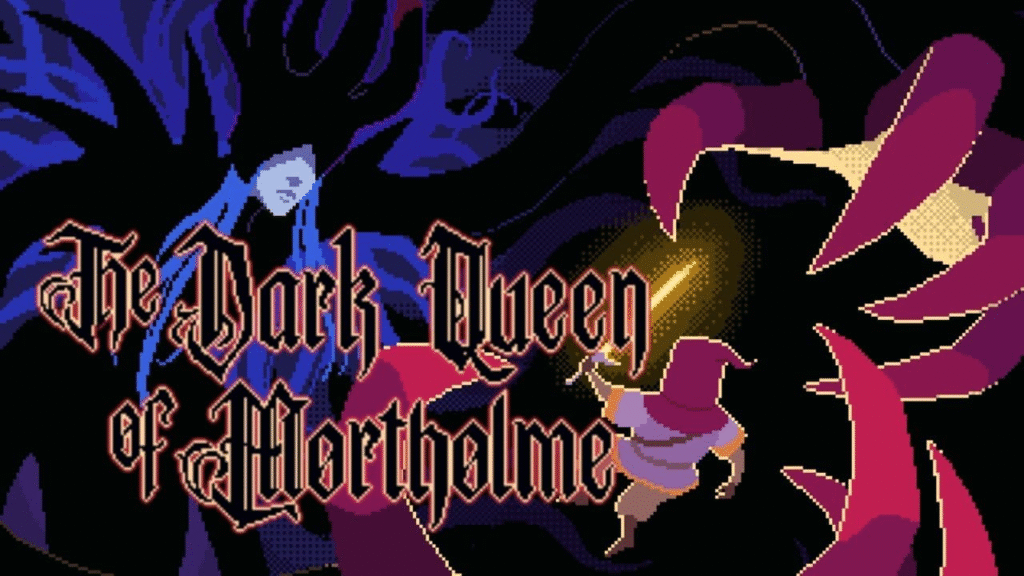Most games cast you as the hero battling through dungeons, fighting monsters, and eventually clashing with the ominous final boss. The Dark Queen of Mortholme flips that script. In this short-form indie title from Mosu and Monster Theater, you play not as the plucky adventurer but as the endgame villain herself: the Dark Queen. It’s a clever twist on the familiar formula, one that mixes pixel art action, visual novel-style dialogue, and themes of inevitability, perspective, and change. The result is a small but striking experience that lingers longer than its half-hour runtime might suggest.
Playing the Final Boss
You are the Dark Queen of Mortholme, an entity of eternal power who has never known defeat. When a lone hero breaches your throne room, the battle feels like a formality—your mace crushes him in a few swings, your magic circle overwhelms him, and he falls as expected. Yet instead of staying dead, the hero returns. And then returns again.
At first, his persistence feels absurd, almost laughable. But each rematch brings change. The hero adapts, growing stronger, dodging faster, countering attacks he once stumbled into. While you remain unshaken in your supremacy, the cracks in your worldview begin to show. Where the queen embodies permanence, the hero embodies change, and their repeated encounters form the backbone of the story.

A Facade of Combat
On the surface, The Dark Queen of Mortholme looks like a boss fight simulator. From a fixed screen, you deploy a limited arsenal—mace swings, charge attacks, and spell circles—while the hero tries to survive. The first few encounters give you the illusion of control. You can flatten the hero in seconds, and it feels satisfying to do so.
But the deeper you go, the more the truth reveals itself. The hero reads your inputs, dodges blows that should have landed, and shrugs off attacks that once decimated him. The queen’s moveset never evolves, while the hero’s toolkit grows. What begins as action quickly transforms into commentary: you’re not meant to win, at least not in the traditional sense.
This tension between the mechanics and the narrative is divisive. Some players enjoy how it reinforces the theme of inevitability. Others find it frustrating when their skill feels irrelevant. In truth, the combat is less the main attraction and more the connective tissue between conversations, a means to highlight how persistence reshapes the relationship between hero and queen.
A Story of Change
The dialogue exchanges between the Dark Queen and the Hero elevate the game far beyond its simple mechanics. Before and after battles, they speak of purpose, failure, hope, and inevitability. The queen scoffs at the hero’s optimism, but over time, she begins to question her own unchanging nature.
Depending on your dialogue choices, the story can end in different ways. You can dismiss the hero and cling to eternal rulership, recognize his perspective and soften, or unlock a secret ending that challenges your assumptions entirely. The choices are small but carry surprising weight, giving the game replay value despite its brevity.
At times, there’s even a hint of romance buried beneath the exchanges—a subtle affection that grows from the shared struggle. Whether you read it as literal or metaphorical, it adds another layer of depth to what could otherwise be a straightforward clash of archetypes.

Art and Atmosphere
The presentation of The Dark Queen of Mortholme is deceptively modest. Its fixed-screen pixel art is beautifully handcrafted, with the queen towering over the comparatively small hero. Each frame carries weight, and each strike feels deliberate. The art direction reinforces the imbalance of power while letting the dialogue handle the shift in dynamics.
The haunting score completes the package. Somber tones and eerie melodies fill the throne room, enhancing both the combat and the quiet exchanges between battles. It’s a soundtrack that feels perfectly in tune with the game’s melancholy mood.
Length and Structure
This is not a game that overstays its welcome. Designed to be completed in one sitting, it runs between 30 minutes and 2 hours, depending on how many endings you pursue. Some players 100% the achievements in under an hour. Others linger for multiple playthroughs, curious about how small shifts in dialogue alter the outcome.
The short length may disappoint those expecting a meatier experience. But the conciseness is deliberate—every word, every fight, every pause serves the core theme. Stretching the concept further might have dulled its impact.
Criticisms and Flaws
No indie project is perfect, and The Dark Queen of Mortholme is no exception. The most common criticism is the combat. It’s simplistic, limited, and eventually undermined by the hero’s scripted resilience. Watching attacks phase through him without effect can feel cheap, especially if you enter expecting a true skill-based boss simulator.
Others note the price-to-length ratio. For some, paying a premium for a game that lasts less than an hour feels steep. The story and art justify the experience for many, but expectations should be set: this is closer to a narrative experiment than a full-scale action RPG.
Still, most agree that the dialogue, atmosphere, and concept outweigh these shortcomings. It’s better to view the combat as part of the story rather than the main draw.
The Power of Perspective
What makes The Dark Queen of Mortholme special is its perspective shift. We’ve all fought bosses dozens of times, dying, learning patterns, and returning until we finally triumph. Rarely do we consider how the boss might feel, watching a persistent hero get stronger with every attempt.
By making you the boss, the game flips the script and makes you confront inevitability from the other side. You begin powerful and unshaken, but as the hero grows, you face not only a challenger but the reality that change comes for all things—even eternal queens.
The Dark Queen of Mortholme: The Dark Queen of Mortholme is short, simple, and occasionally frustrating, but it’s also heartfelt, unique, and thought-provoking. Its pixel art is lovely, its music haunting, and its story concise yet impactful. If you approach it expecting a traditional action game, you may walk away unsatisfied. But if you accept it for what it is—a narrative-driven exploration of persistence, change, and perspective—you’ll likely find its half-hour runtime well worth the investment. – ColdMoon


